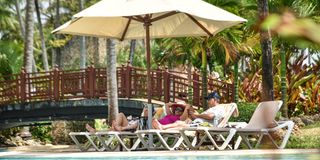High-end hotels affected the most by Covid-19 as local visitors boost sector

Tourists enjoy themselves at the Sarova Whitesands Beach Resort in Mombasa. In the absence of international tourists, many such high-end facilities are finding the going tough due to lack of business.
What you need to know:
- In the absence of international tourists, high-end facilities are finding the going tough due to lack of business.
- According to the Kenya Association of Hotelkeepers and Caterers (KAHC) Chief Executive Officer Mike Macharia, recovery of the sector depends on both local and international tourists.
- In June, the Fairmont Hotel Group closed its Norfolk and Mara Safari Club hotels and fired all its employees over lack of business.
- According to KTF central regional manager Samuel Ondieki, most of the revenue was generated from medium and small establishments targeting domestic tourism.
Domestic tourism is now emerging as a lifeline for the hospitality industry as the effects of the Covid-19 pandemic continue to bite the sector.
In the absence of international tourists, high-end facilities are finding the going tough due to lack of business.
Data from the Kenya Tourist Fund (KTF) shows that the amount of levies collected dropped from Sh400 million to Sh70 million monthly, recording a decline of more than 80 percent.
Since re-opening of hotels, medium-sized and small businesses targeting local tourists have contributed more to the revenue than would otherwise have been the case under normal circumstances.
A senior officer at the fund who requested anonymity as he not authorised to speak on behalf of the organisation, said closure of bars aside, the industry recorded a massive drop given the number of hotels in operation.
“Two percent of the levies collected from hotels go into funding the Kenya Tourism Board (KTB) and Utalii College. The decline in revenue will have implications on these bodies,” said the official.
According to the Kenya Association of Hotelkeepers and Caterers (KAHC) Chief Executive Officer Mike Macharia, recovery of the sector depends on both local and international tourists.
In order to stay in business during this period, the KAHC boss said, the mostly affected hoteliers had resorted to money lending institutions.
“We need to find a way back somehow as lack of market has forced luxury hotels to survive on loans which will not be sustainable in the long run,” he said.
Mr Macharia further added the scaling down of operations in the industry had affected the human resource.
"Hotel employees are either on unpaid leave, working on redundancies or without pay,” said Mr Macharia.
Effects of the pandemic
In June, the Fairmont Hotel Group closed its Norfolk and Mara Safari Club hotels and fired all its employees over lack of business.
In a memo, the hotel group told its employees that the pandemic had caused a disruption of business forcing it to cease its operations.
In the central region, the industry has already registered a more than 40 percent increase this month in comparison to the last three months.
In the months of June, July and August the Tourism Fund collected a cumulative amount of levies of Sh7 million.
In the month of September, the region has already registered more than Sh1 million in levies.
According to KTF central regional manager Samuel Ondieki, most of the revenue was generated from medium and small establishments targeting domestic tourism.
“Domestic tourists have started gaining confidence in the local hospitality industry with accommodation being a benefiting factor,” he said.
However, luxury hotels in the region remained on the receiving end.
The area is divided into four zones which are Mount Kenya East, West, North and South.
The Mount Kenya North Zone which consists of Marsabit and Isiolo counties was the most affected by the effects of the pandemic as it is largely dependent on the large establishments.
Stimulus policy
“Most of the luxury hotels in the north would each pay levies of about Sh200,000 monthly but the amount has now decreased to around Sh5,000 monthly,” he said.
Before the pandemic, the region would collect Sh10 million monthly from the four zones.
Affected tourism players are now banking on the Sh3 billion of the stimulus economic programme to try and salvage the situation.
The economic package which was commissioned by the president during the Madaraka day celebrations will be channeled and disbursed through the Tourism Finance Corporation (TFC).
According to the corporation’s managing director Jonah Orumoi, the stimulus programme it to launched today and thereafter hotels will be given a platform to apply for it.
Interested applicants will be required to apply for the soft loans online for a period of 21 days.
“The stimulus policy will be given at five percent over a period of 10 years. It will fund business capital restructure, reducing operating costs and refurbishment of facilities,” said Mr Orumoi.
Successful loan applicants will also be given a grace period of one year.
The Parliamentary Budget Office (BPO) estimates have shown that the Tourism sector contributes Sh70 billion to the country’s Gross Domestic Product (GDP).
However, such numbers will not be forthcoming this year as the sector reels from the impact of Covid-19.





